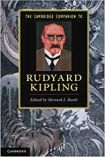The Cambridge Companion to Rudyard Kipling by Howard J Booth (editor)
| The Cambridge Companion to Rudyard Kipling by Howard J Booth (editor) | |
|
| |
| Category: Reference | |
| Reviewer: Lesley Mason | |
| Summary: A detailed and entertaining round-up of current critical views of Kipling's work. A reference book, rather than a general read. | |
| Buy? Maybe | Borrow? Maybe |
| Pages: 199 | Date: August 2011 |
| Publisher: Cambridge University Press | |
| ISBN: 978-0521136631 | |
|
| |
Rudyard Kipling, born in India in 1865, is still the youngest ever Nobel literature laureate. He was a prolific author and at the turn of the century up to the first World War an immensely popular one. Even now he remains the most frequently quoted of all English authors (with the possible exception of Shakespeare) – albeit often taken out of context.
Most of us will have read Kipling. Most of us will not have very much of him – The Just So Stories, or Kim or a few bits of verse - or even be aware of just how much of him there is to read. Or just how many ways of reading him there are.
This book shows you both and, for those of us weird enough to read it without having an ulterior motive (like an English degree pending), it's intriguing enough to send you back to the source material.
The coverage of the selected essays is impressively broad with contributions from an international batch of teachers, Readers, Lecturers and Professors, namely:
Howard J Booth, Manchester
David Bradshaw, Oxford
Patrick Brantlinger, Indiana
Laurence Davis, Glasgow
Robert Hampson and Bart Moore-Gilbert, London
John McBratney, Cleveland
Jan Montefiore and Nagai Kaori , Kent
Judith Plotz, George Washington
Harish Trivedi, Delhi
Monica Turci, Bologna
Subject areas are divided into three sections: themes, texts forms & chronological periods, and responses to the author. Themes include sexuality and gender, attitude to colonialism and the Empire, America, science and technology, and the author's changing response to war. The last particularly after the loss of his son Jack at Loos. Form and text essays look specifically at the longer works, the short stories, the books for children and the poetry. Although only the final few chapters are specifically about responses to the author, no analysis of Kipling's work can avoid the response.
He was a man Empire. Brought up Anglo-Indian, with Hindustani as his first language ahead of English, at least until he was sent home to England at the age of six. With University being impossible on financial grounds he happily went back to India as soon as school was over. Although a journalist, rather than strictly of the Raj classes, he was part of that world. It is almost a given that it should be reflected in his writing and not necessarily to be condemned from our modern vantage point. Although some of his language is unthinkable now, it was common coinage at the time and we shouldn't allow it to blind us to the intention behind the words. The writing, most of these analysts agree, deserves a deeper consideration than that.
Generally speaking the essays run to about eight to ten pages, each with a page or two of notes and bibliography, the whole supplemented by a general index covering the volume in total.
Reading it without reference copies of the texts to hand is interesting, but there is an understandable assumption of a fair degree of familiarity with the whole output. Some contributors illustrate their points well with deft use of quotations; others make mere references to character or incident which is deemed sufficient to make the point. However, let's be honest, this book isn't written for the general reader. It is a study aid. If you're not an English student or a major Kipling fan, then it's not going to make it to your bedside reading list. If you are either of those things, it should make it to the top of your Christmas wish list.
To be appreciated you really need to be heavily into the complete works, though individual essays will enhance any Kipling you've got on hand.
If this book appeals then you might also enjoy The Cambridge Companion to the Literature of London by Laurence Manley (editor).
Please share on: ![]() Facebook,
Facebook, ![]() Twitter and
Twitter and
![]() Instagram
Instagram
![]() You can read more book reviews or buy The Cambridge Companion to Rudyard Kipling by Howard J Booth (editor) at Amazon.co.uk Amazon currently charges £2.99 for standard delivery for orders under £20, over which delivery is free.
You can read more book reviews or buy The Cambridge Companion to Rudyard Kipling by Howard J Booth (editor) at Amazon.co.uk Amazon currently charges £2.99 for standard delivery for orders under £20, over which delivery is free.
![]() You can read more book reviews or buy The Cambridge Companion to Rudyard Kipling by Howard J Booth (editor) at Amazon.com.
You can read more book reviews or buy The Cambridge Companion to Rudyard Kipling by Howard J Booth (editor) at Amazon.com.
Comments
Like to comment on this review?
Just send us an email and we'll put the best up on the site.


